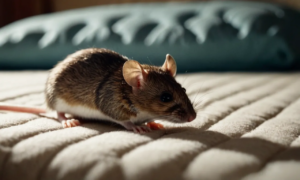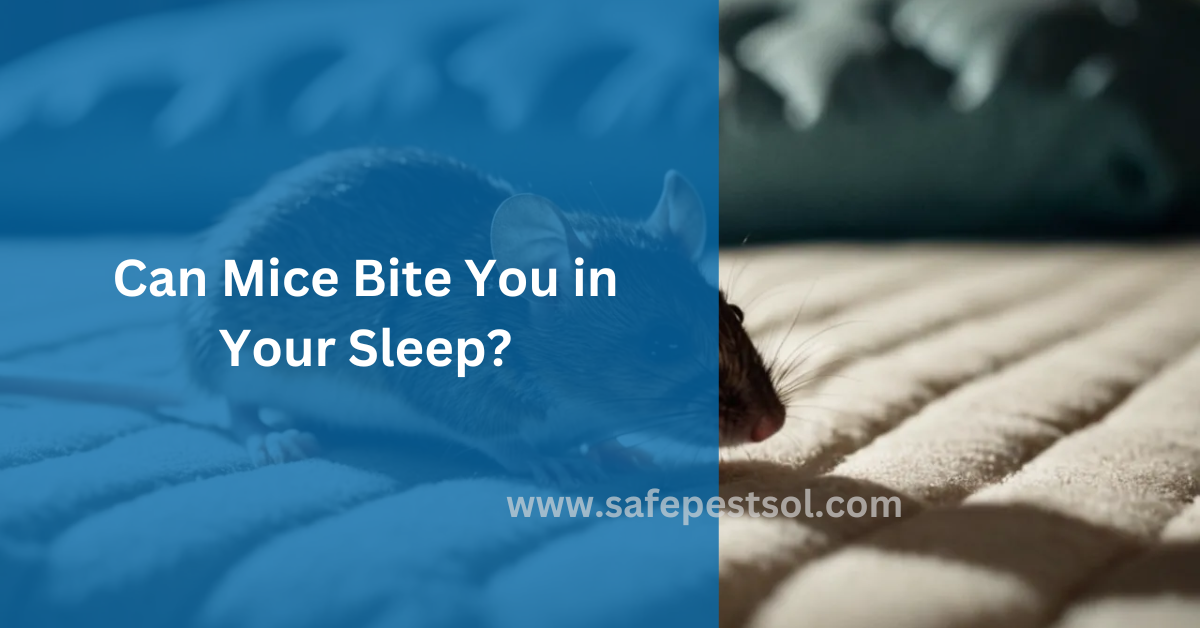Will Mice Bite You in Your Sleep?
No one likes a mouse in his house. In fact, most of us get terrified at night when mice get into their bedrooms to look for food sources or shelter. But do mice really go ahead and bite humans, especially while we are sleeping? Let’s find out.

Can Mice Bite You When You Sleep?
Although a mouse is very likely to bite a sleeping person, it’s possible. Mostly, mice bite humans only when they feel frightened or cornered. Mice are nocturnal creatures, so their nibbling instinct for food crumbs, leading them to enter the bedroom. This means, mice enter into bedrooms just to find a food source, not with the intention to bite someone.
However, if a mouse is hungry and smells food on a person’s skin, it may bite while trying to get to the potential food sources. Mice infestations in the house increase the likelihood of bites, especially in areas with poor pest control.
Do Mice Bite at Night?
Mice are one of the nocturnal animals. This is why they mostly go out of their shelter at night. They spend most of their time in searching for food sources, chewing materials, and exploring hidden areas. If any area of your house is infested, the chances of getting bitten by mouse become higher.
Mostly, cases of mice bites happen at night when you accidentally touch or roll onto the rats while sleeping. This action frightens the rodent, leading it to bite as a means of defense.
Is It Dangerous to Get Bitten by a Mouse While Sleeping?
Yes, getting bitten by a mouse can cause severe damages. Since such rodents spread bacteria, viruses and parasites, getting infected could be possible. If you ignore mice infestation at your home, you may get bitten by a mouse, which requires quick medical attention.
Health Risks of a Mouse Bite
There can be harmful bacteria introduced into the bloodstream from the mouse bite. Some of the most common infections include:
- Swelling and Redness: You may notice inflammation, redness, and painful swelling related to an infection.
- Pain and Itching: A bacterial infection can spread if you don’t notice, resulting in fever, chills, and fatigue.
- Fever or Infection: A mouse bite may cause itching or a burning sensation because of an allergy reaction around the bite area.
Diseases Caused by Mouse Bites
1. Rat-Bite Fever
A bite from a mouse can take the shape of rat-bite fever, which is an infection by bacteria spread through direct contact with rodents. The symptoms includes fever, muscle aches, and rash. If left untreated, it becomes seriously bad ,which requires medical attention.
2. Bubonic Plague
Though this is very rare today, house mice and wild rats may carry fleas that transmit the bubonic plague. The disease is characterized by a high fever, swollen lymph nodes, and extreme fatigue. It is spread through human contact with infected fleas or rodents in heavily infested areas.
3. Allergic Reactions
Some people may react to mouse bites through allergies. This would severely cause itching, swelling, or breathing problems. Droppings and urine from mice in living spaces can also trigger asthma and allergic sensitivity in health.
4. Other Infections
If left untreated, mouse bites lead to infections from bacteria and increase the possibility of serious health problems. Mice infestation exposes people to harmful bacteria from food sources, droppings, and contaminated areas. This is why taking precautions can reduce such risks.
Tips to Avoid Mouse Bites While Sleeping
1. Keep Your Bedroom Clean
Mice are attracted by food crumbs and spills. Cleaning the bedroom minimizes infestation. Put everything in sealed containers and avoid eating in the bed. Regular cleaning and vacuuming will remove mouse droppings, which causes an infestation.
2. Seal Entry Points
Cice can squeeze through tiny holes in your house. Use steel wool to fill entry holes in walls, floors, and near pipes. Look in hidden areas for gnaw marks or small holes, which hints rodents are entering. Seal those spots first, so that house mice can’t find their way to your home.
3. Use Pest Control Methods
By installing traps in any infested place, you can control the infestation. Some DIY techniques might prevent mice from entering your home, such as peppermint oil. If such methods won’t work, it is essential to seek a professional exterminator to eliminate the infestation.
4. Keep a Cat
Cats are one of the primary predators of rats, making them a natural pest control. If you have a cat pet, it can reduce the changes of having mouse infestation. Since mice don’t interfere in places where wild rats or other predators live, having a cat is one of the effective way to keep rats away from your room.
What to Do If a Mouse Bites You While Sleeping?
1. Clean the Bite Area
Immediately wash the area where you see mouse bite marks with soap and warm water to remove bacteria. Apply an antiseptic to prevent infections. Keeping the wound clean reduces the risk of rat-bite fever or other diseases mice can carry.
2. Monitor for Symptoms
If you feel swelling, redness, or fever, it may indicate an infection around bitten area. Not so commonly, but few people may also experience allergic reactions. If the condition gets worsen, just seek immediate medical attention.
3. Identify Possible Infestations
Check your room if there are mice droppings, gnaw marks, and shredded materials. Finding such things are signs of having mice in your room. Look for some food sources in your room that may attract them. Also, use all preventive measures available to stop rodents from coming again.
4. Contact Pest Control
If you face mice infestation aging, get in touch with a professional exterminator. Pest control experts can identify possible entry points you may not notice and give a long-term solution to keep out rodents from your house and not to be bitten again.
Conclusion
While mouse bites during sleep are rare, it is possible. Mice infestations in your home increase the chances of contact with these rodents. Keeping your living space clean, sealing entry points, and using pest control methods can prevent bites. If mice ever bites you, prior to clean the wound and seek medical attention if necessary.
FAQs
1.What are the signs of mouse infestation?
Some of the signs are noticing mouse droppings, tiny holes in your walls and gnaw marks. You might also hear scratching sounds at night or find food sources disturbed.
2.What attracts mice to bedrooms?
Mice often visits bedroom to look for food crumbs and warmth. They stay in rooms if the area is littered with things and food is open.
3.Can a mouse bite make you wake up from sleep?
Yes, but mouse bites are generally minor. If bitten, you may feel only a slight pain or sore. Moreover, you may get infected, which is rare.
Want a Solution for Rats in Your Home?
If yes, let Safe Pest Sol handle it. Our team of experts know all effective methods to make your home free from pests. Just call us right away and book our services right now!

